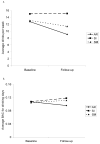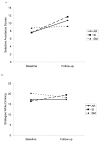Drink less or drink slower: the effects of instruction on alcohol consumption and drinking control strategy use
- PMID: 20025364
- PMCID: PMC2805122
- DOI: 10.1037/a0016580
Drink less or drink slower: the effects of instruction on alcohol consumption and drinking control strategy use
Abstract
Brief alcohol interventions often involve recommendations to use drinking control strategies. However, little is known about the functional effect of these strategies on alcohol use. This prospective study employed an experimental design to evaluate the relationship between strategy use and alcohol consumption. The differential effects of instructions to increase the use of strategies or to reduce alcohol consumption were compared to self-monitoring (SM) only. Undergraduate drinkers were randomized into 3 conditions: SM plus strategy increase (SI; n = 61), SM plus alcohol reduction (AR; n = 60), and SM control (SM; n = 56). Participants in the AR group reduced their alcohol use over 2 weeks, while those in the SI group did not drink less. Participants in the SI group increased strategy use over time, whereas the AR group increased use of some strategies but not others. These results indicate that increasing use of drinking control strategies does not necessarily result in reduced drinking. Furthermore, all strategies are not equal in their association with alcohol consumption; if the goal is alcohol reduction, type of strategy recommended may be important.
Copyright 2009 APA
Figures




References
-
- Aertgeerts B, Buntinx F. The relation between alcohol abuse or dependence and academic performance in first-year college students. Journal of Adolescent Health. 2002;31:223–225. - PubMed
-
- Benton SL, Benton SA, Downey RG. College student drinking, attitudes toward risks, and drinking consequences. Journal of Studies on Alcohol. 2006;67:543–551. - PubMed
-
- Benton SL, Schmidt JL, Newton FB, Shin K, Benton SA, Newton DW. College student protective strategies and drinking consequences. Journal of Studies on Alcohol. 2004;65:115–121. - PubMed
-
- Burish TG, Maisto SA, Cooper AM, Sobell MB. Effects of voluntary short-term abstinence from alcohol on subsequent drinking patterns of college students. J Stud Alcohol. 1981;42:1013–1020. - PubMed
Publication types
MeSH terms
Substances
Grants and funding
LinkOut - more resources
Full Text Sources
Medical
Research Materials

